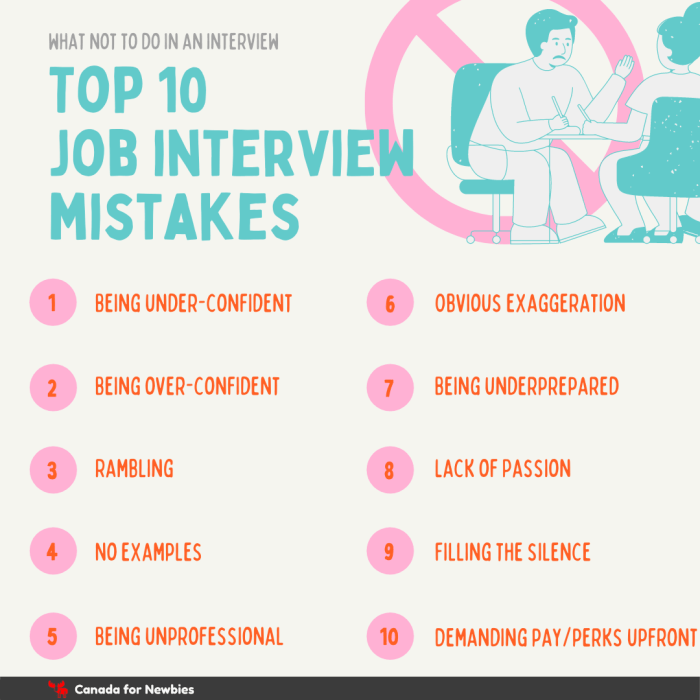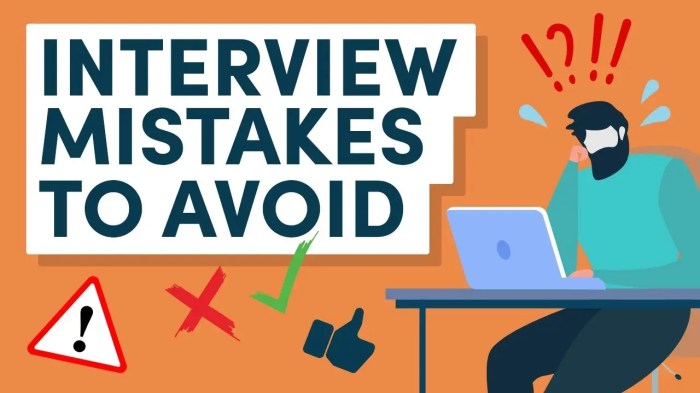Common mistakes during job interviews sets the stage for a revealing journey into the blunders that can make or break your interview success. From wardrobe mishaps to body language blunders, this exploration will equip you with the knowledge to navigate the interview landscape with finesse.
Discover the pitfalls to avoid and the secrets to mastering the art of interviewing in this comprehensive guide.
Common Mistakes during Job Interviews

Research is a crucial step before a job interview as it demonstrates your interest in the company and position. It allows you to tailor your answers to match the company’s values and goals, giving you a competitive edge over other candidates.
Discover how Job openings in renewable energy sector has transformed methods in this topic.
Importance of Research Before a Job Interview, Common mistakes during job interviews
Before attending a job interview, it is essential to research the company, its culture, values, and recent news or projects. This information will help you understand the company’s background and how you can contribute to its success. Additionally, researching the position you are applying for will enable you to align your skills and experiences with the job requirements, increasing your chances of being selected.
Inappropriate Attire Choices for an Interview
- Wearing casual attire such as jeans, T-shirts, or sneakers.
- Showing too much skin or wearing revealing clothing.
- Overdoing it with accessories or heavy makeup.
- Not dressing according to the company’s dress code or industry standards.
Proper Body Language During an Interview
- Make eye contact with the interviewer to show confidence and interest.
- Sit up straight and avoid slouching to appear attentive and engaged.
- Offer a firm handshake at the beginning and end of the interview to convey professionalism.
- Avoid fidgeting or playing with hair, jewelry, or other objects as it can be distracting.
Strategies for Answering Interview Questions

When preparing for a job interview, it is crucial to not only focus on avoiding common mistakes but also on effectively answering interview questions. This can make a significant difference in how you present yourself to potential employers and increase your chances of landing the job.Practicing common interview questions beforehand can help you feel more confident and articulate during the actual interview.
This preparation allows you to think about your responses and tailor them to showcase your skills and experiences effectively.
The STAR Method for Answering Behavioral Questions
- When faced with behavioral questions that ask about past experiences, the STAR method can be a useful framework to structure your responses.
- Situation: Describe the context and background of the situation you are discussing.
- Task: Explain the specific task or goal you needed to accomplish.
- Action: Detail the actions you took to address the situation and achieve the task.
- Result: Share the outcomes of your actions and highlight what you learned from the experience.
Tailoring Answers to Job Requirements
- When answering interview questions, it is essential to tailor your responses to the job requirements and responsibilities.
- Review the job description and identify key skills and qualifications the employer is looking for.
- Provide examples from your past experiences that demonstrate how you possess the necessary skills and qualities for the role.
- Highlight specific achievements and accomplishments that align with what the employer is seeking in a candidate.
Post-Interview Etiquette
After a job interview, it’s crucial to maintain professionalism and leave a positive impression. This includes sending a thank-you email, following up appropriately, and handling rejection with grace and dignity.
Thank-You Email Etiquette
Sending a thank-you email after an interview is a great way to show appreciation for the opportunity and reiterate your interest in the position. Here are some essential elements to include:
- Express gratitude for the opportunity to interview for the position.
- Reiterate your interest in the role and the company.
- Mention something specific from the interview that resonated with you.
- Highlight your qualifications and how they align with the job requirements.
- Close the email with a polite thank you and a mention of looking forward to hearing back.
Dos and Don’ts of Following Up
Following up after an interview is important, but it’s crucial to do so in a professional and respectful manner. Here are some dos and don’ts to keep in mind:
- Do: Send a follow-up email within 24-48 hours of the interview.
- Do: Reiterate your interest in the position and inquire about the next steps in the hiring process.
- Don’t: Bombard the interviewer with multiple follow-up emails or phone calls.
- Don’t: Demand an immediate response or act impatient.
Handling Rejection Gracefully
Receiving a rejection after an interview can be disheartening, but it’s essential to handle it with professionalism and grace. Here are some tips on how to do so:
- Express gratitude for the opportunity to interview and for the feedback provided.
- Ask for constructive criticism to improve your future interviews.
- Maintain a positive attitude and continue networking within the industry.
- Remember that rejection is not a reflection of your worth as a candidate.